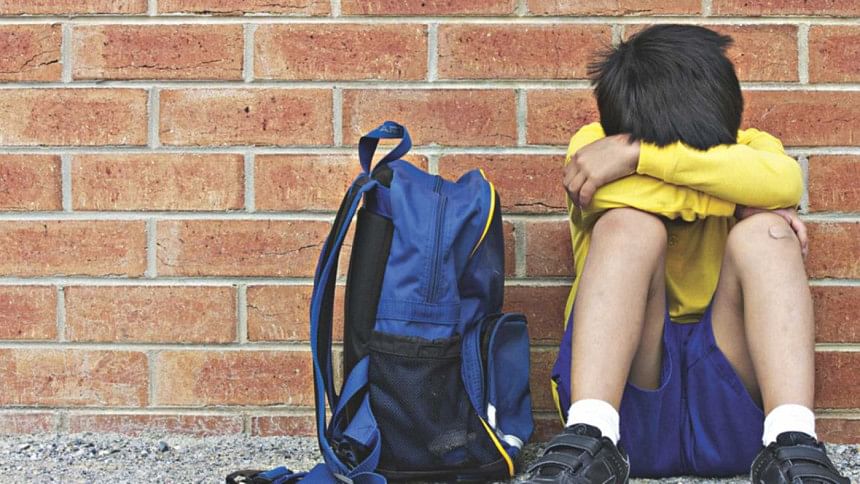Ghosts in the classroom

"It was the best of times, it was the worst of times," wrote Charles Dickens at the beginning of "A Tale of Two Cities." No other quote in the literary canon captures my experience in the Bangladeshi education system as succinctly as Dickens'. School changed my life for the better, but it also nearly took it away.
I titled this piece "Ghosts in the classroom" because, in fourth grade, that's what I thought every time my stationary went missing and the contents of my pencil box were scattered outside my classroom window. Spooky! I couldn't even consider the possibility that the "ghosts" were my classmates who began to bully me and damage my possessions to punish me for my strong academic performance in our class.
Apart from my academic strengths, multiple axes of my identity set me apart. I am from Dhaka. In Dhaka, I grew up in a single-parent household as a child of a Hindu-Muslim couple. After my father left, my mother and I struggled to make ends meet, with no assurance about how we would afford next month's rent and school fees. Yet, my mother insisted that I have the best possible education available in town. Due to her efforts, I was eventually admitted to one of the premier English medium educational institutions in the country. Let's call it "School Y."
I received an excellent primary education at School Y. I studied in an interdisciplinary curriculum, which placed self-inquiry and social action at the centre of my learning. In class, I explored ancient civilisations, the solar system, different religious customs around the world, human migration, the environment—the list goes on. Every day was an adventure. However, I felt weighed down by a pile of secrets, such as the whereabouts of my father, my religious identity, and the poverty in which we lived. Then, in the fifth grade, my class teacher kept me back during lunch to ask if anything was bothering me, and immediately I broke down in tears as all the pain inside my heart welled up and escaped my lips. Her presence made the classroom feel safe.
On the other hand, my classmates threw my stationary, which I could barely afford, out the window. Additionally, a barrage of comments circulated in the classroom about my weight. During report card days, my mother, who felt defeated at every other aspect of her life, proudly entered the school grounds to learn once again that I had topped the class. After classes resumed, the bullying got worse.
When I cut my hair short (described in Dhaka as a "boy cut"), the comments became more hurtful. My classmates called me a "hijra." During the winter, I wore a sweater made out of jute (once a dominant industry in our country), and they called me "bosta" (sack). Rumours went around about the exact nature of my mother's profession; what could a single woman in our society possibly do to afford to send her daughter to a private school? My classmates found a particularly unflattering photo of me taken after a dance performance. In an anonymous Facebook group, that image was posted over the name of a male student in my class.
Looking back, what surprises me the most is that no mature adult in the school intervened. No one ever confronted my abusers. I suppose a scholarship student who paid half price wasn't worth the trouble of angering students and parents who paid the full price. After all, School Y often suspended me for weeks on end when my mother couldn't pay tuition fees.
My mental health deteriorated. I became a Unicef statistic: one in three children globally experience bullying (including leaving children out of activities, making inappropriate sexual remarks, and cyberbullying). Subsequently, I developed an obsessive desire to lose as much weight as quickly as possible. Over three months, I went from 67 kilograms to 45. But I wasn't ready to stop dieting or exercising. I continued with week-long fasts. I ate only a few carrot sticks and ran on the elliptical for five hours every day. Eventually, my family and I realised that I had an eating disorder called anorexia nervosa. As a result of my condition, I was hospitalised and force-fed, because the psychiatrists didn't know how to treat me.
When I returned to school, the taunting continued. Then, the head of our school threatened to expel me because I reflected poorly on the school's reputation! School Y was no longer a safe haven.
We know about Samin, a 10th grader who was bullied about his weight, who wanted to die from the humiliation, and who developed anorexia, like myself, but unlike me, who passed away.
Who is responsible for Samin's death, for my painful childhood experiences? The bullies? The families that fostered a sense of unhealthy competition and judgemental attitude about weight? The teachers and school authorities who failed (or refused) to intervene? The school board for not enacting responsible policies to deal with bullying incidents, and prioritising profits before students' lives? The country which is yet to develop the legal framework to create and implement effective anti-bullying laws in schools? Or a world where violence and domination reign and the weak suffer?
Notwithstanding my difficult childhood experiences, things worked out fine. After changing schools, I received numerous awards in my high school years, including a US Department of State-funded exchange programme and a summer camp opportunity in Mahindra United World College in India. In 2017, I joined Minerva University in San Francisco, where I pursued a dual undergraduate degree in computer science and politics on yet another full scholarship. As a college student, I had the opportunity to travel worldwide, and I worked in different sectors, including education, public policy, and computational social science, at some of the world's preeminent institutions. In October, I will begin my graduate degree in development studies at the University of Cambridge on a fully funded scholarship. It's not been easy, but these accomplishments would not have been possible were I stopped in my tracks in the seventh grade.
We need bold and urgent action in Bangladesh to end bullying, which haunts our educational institutions and the society at large. Besides legal policies and changes at the school administration level, we need honest and rigorous education in anti-bullying for students and teachers alike. Additionally, bullied students should be empowered to seek help, and schools must develop systems to support them with adequate counselling services and other interventions.
If we come together, I know that we can ensure a safe, dynamic, and best-of-times experience in school for every child in Bangladesh.
Kate Tanha grew up in Uttara, Dhaka, and is currently pursuing her MPhil degree in development studies at the University of Cambridge in the UK.

 For all latest news, follow The Daily Star's Google News channel.
For all latest news, follow The Daily Star's Google News channel. 



Comments